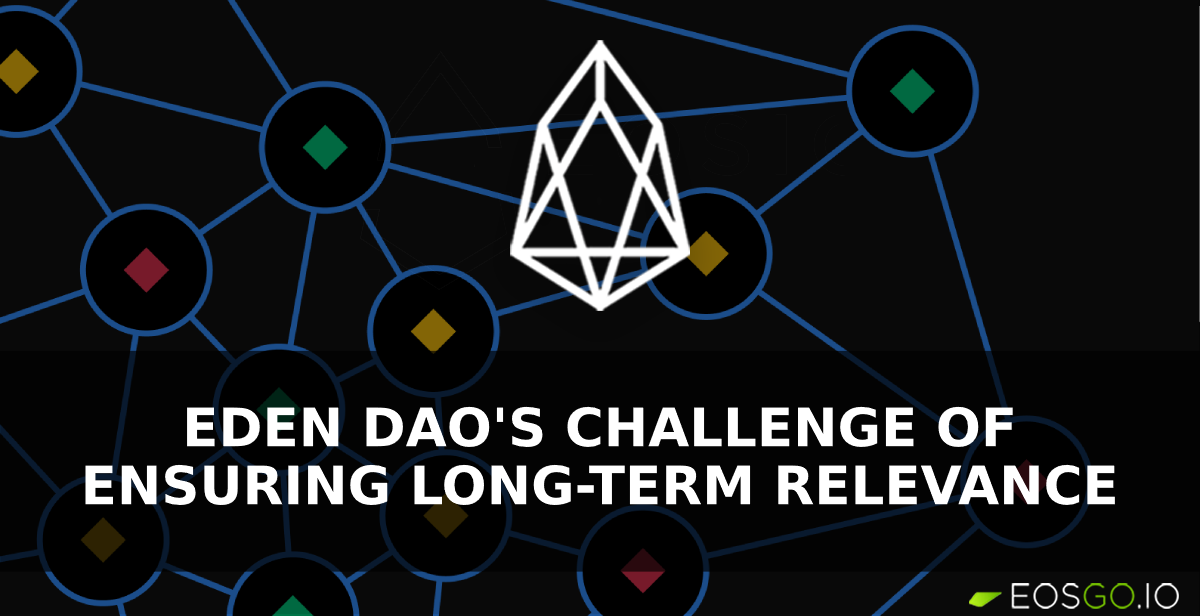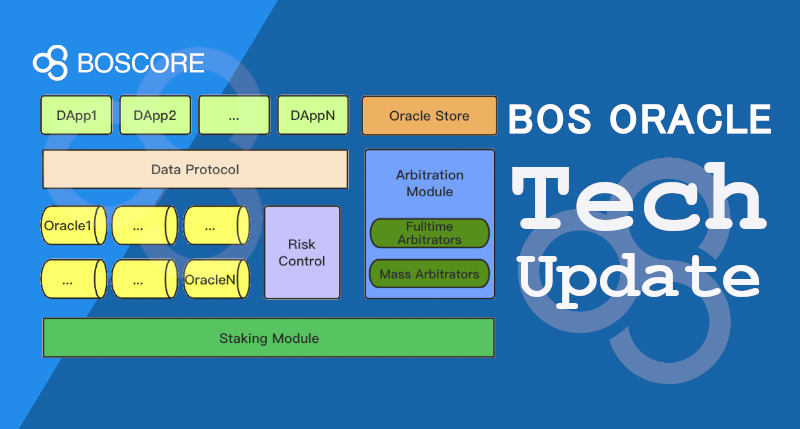Eden DAO's Challenge of Ensuring Long-Term Relevance

Blockchain networks, and their respective communities, can be considered as being a part of a decentralized autonomous organization (DAO) where they collectively make up a transparent and globally distributed form of governance. Each blockchain network is slightly different from the next and recognized by their distinct characteristics that dictate the rules of usage and operation within their ecosystems.
These decentralized blockchain networks such as EOS, Bitcoin, and Ethereum, work independently of each other, and to an extent, perform slightly differing functions. They also offer the wider blockchain community different services and products to interact with, and in their own unique ways. In a way, although each is independent of the others, collectively they form a larger global network that is much more decentralized and autonomous than each individual blockchain network.
Adopting that ideology into a more concentrated effort on decentralized governance are the smaller community organizations, within larger blockchain networks, that establish their own DAOs. These DAOs are usually formed to serve specific purposes that are mutual to all of its members and/or participants.
Eden DAO
Eden is a community that is working on maximizing the power and independence of its members. Using a “revolutionary new democratic process” the Eden DAO empowers its independent members with the ability to effectively reach consensus. Through various rounds of voting, a group of individuals are elected and funded by the DAO to help them achieve their respective missions to make a positive impact in their communities and even globally.
Eden on the EOS blockchain held its first official elections on October 9, 2021, following two trial elections in May and July 2021. The Eden DAO was initially funded with $1.2 million by the EOS Network Foundation (ENF). With Eden operating as a public goods initiative on the EOS blockchain, these funds were provided to the DAO’s elected delegates to help them deliver on their campaign promises.
However, as each new election cycle occurs every three months and sees new delegates get elected; this hampers the project’s continuity. Each time a new election takes place current delegates are replaced after only three months in the position. This means that it is difficult, to nearly impossible, for elected delegates to make any medium to long-term plans knowing they wouldn’t be around to deliver on them. Especially as it pertains to having an impact in the long-term success of the Eden organization itself.
This raises questions about whether the frequency of the current election cycle term is effective enough to ensure Eden’s longevity and relevancy going into the future. Even though the format of the current election cycle was designed so that incumbents couldn’t remain in power or control long enough to corrupt the system. Which is something that a longer serving term could jeopardize.
A possible solution could be to have rolling elections where half the delegates board is elected every three months for a six month term. In this way there would be some longevity for delegates, long enough for them to make longer term plans that have a much greater impact for the DAO. But with another half of the delegates board elected every three months, it would help prevent any attempts that a 6-month single serving board could have at corrupting the DAO and its systems.
Major Issue
One major issue is that it is hard for delegates to make any new and innovative changes to the Eden DAO that could make it more effective. Past serving delegates have voiced concerns about the obstacles they face when it comes down to passing on the directives of the things they’ve worked on as it pertains to Eden. Oftentimes the main obstacle is that the newly elected delegates board would rather work towards its own objectives than carry the baton for the previous board.
This clearly reveals a weakness in Eden’s current governance process in that it threatens the organization’s long-term viability. In a space where constant innovation is necessary to maintain relevance, Eden’s continuity limitations threaten its effectiveness in making any long-lasting impact in the world. For instance, because Eden changes its delegates board every three months, it makes it near-impossible to have a dedicated core development team to implement the changes necessary to ensure the DAO’s continued relevance in this ever-changing digital landscape.
Hope on the horizon
Last week a proposal on the EOS network to automate its funding of approved projects was introduced for Block Producers to vote on. The proposal has already been approved by 16/21 top BPs and will move into the development phase of the contract systems in the coming months.
Another promising avenue for the Eden DAO is the imminent deployment of Hypha DAO’s “Organization-in-a-box solution”. Hypha DAO has received $850k in grant funding from the EOS Network Foundation to build out their advanced DAO features on the EOS network. The grant is paid out in smaller batches based on each milestone completed, which helps to ensure that its team continues to deliver quality work.
Hypha DAO’s innovative product suite makes it easy for decentralized organizations and communities to organize in a trustless, transparent, inclusive, and affordable manner. Its features enable DAO’s to avoid middlemen and implement blockchain-based, fraud resistant, and efficient processes. Their “Organization-in-a-box solution” contains all of the key tools organizations might need to operate in a decentralized yet efficient manner. If implemented by Eden, it could unlock greater utility for the DAO and its members.
In conclusion
Eden’s pitfalls in its ability to quickly introduce core system changes may hinder its ability to innovate towards a more efficient and impactful future for its organization. This lack of core development would be further exacerbated by the fact that there are multiple Eden’s and each one has its own code repository.
Implementing system wide changes to such an organization is extremely difficult, as well as costly, because any solution that’s implemented would have to be altered with consideration of the small and distinct characteristics that make each Eden DAO operate slightly different from the rest. An example would be the Eden DAO’s iteration on the EOS blockchain (Eden on EOS).
Fortunately, there are solutions out there to improve, tweak, or change the current system components that govern Eden. Implementing them is the true test of decentralized governance: whether or not these communities of diverse individuals are able to reach consensus on core system developments. Especially when considering how governance on Eden is currently set up with the delegates board only serving 3-month terms. That on its own creates time constraints for any long term plans.
Suggested News
EOS Independence Day, A New Era! (September 21)
Today the EOS community is celebrating its official independence from Block.one, after four years of being associated w...
BOSCore announced BOS Oracle
BOSCore developers recently announced the BOS Oracle. This is a service that provides verified external data for DApp s...

